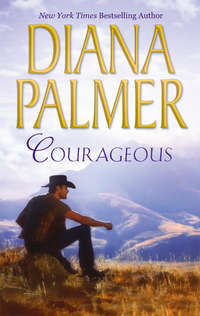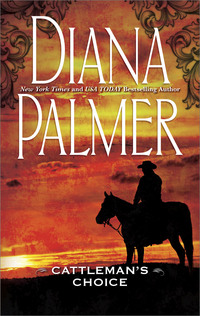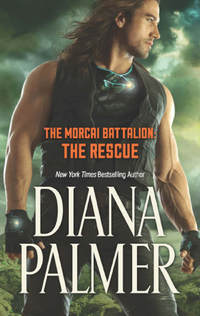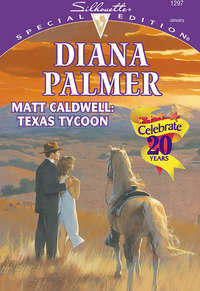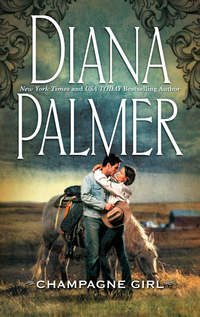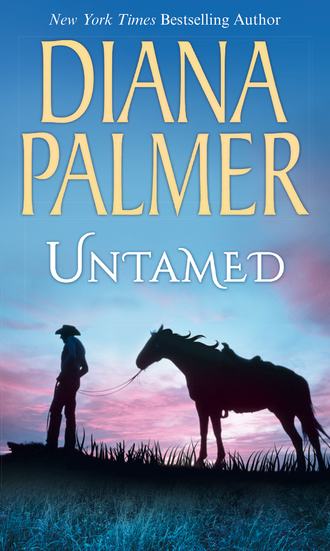
Полная версия
Untamed

The most dangerous man is the only one she wants...
Stanton Rourke lives life on the edge. The steely mercenary is dangerous in every way...especially to Clarisse Carrington’s heart. She and Rourke were playmates as children, but she’s not the innocent girl he once knew. When tragedy robbed Clarisse of her entire family, her life was changed forever. Besides, she’s a grown woman now, and there are secrets that hold her back from succumbing to her pursuer. As she struggles to keep her distance, sparks as hot as a Texas summer fly between them. But danger is following Clarisse, leaving her no choice but to rely on Rourke, even as the old wounds lying dormant between them flare up again...
Praise for the novels of New York Times and USA TODAY bestselling author
DIANA PALMER
“The popular Palmer has penned another winning novel, a perfect blend of romance and suspense.”
—Booklist on Lawman
“Diana Palmer is a mesmerizing storyteller who captures the essence of what a romance should be.”
—Affaire de Coeur
“Readers will be moved by this tale of revenge and justice, grief and healing.”
—Booklist on Dangerous
“Diana Palmer is one of those authors whose books are always enjoyable. She throws in romance, suspense and a good story line.”
—The Romance Reader on Before Sunrise
“Lots of passion, thrills, and plenty of suspense... Protector is a top-notch read!”
—Romance Reviews Today on Protector
“A delightful romance with interesting new characters and many familiar faces. It’s nice to have a hero who is not picture-perfect in looks or instincts, and a heroine who accepts her privileged life yet is willing to work for the future she wants.”
—RT Book Reviews on Wyoming Tough
Untamed
Diana Palmer

Dear Reader,
Stanton Rourke has been one of my favorite characters since he showed up in Tough to Tame, helping protect Cappie Drake from her abusive ex-boyfriend. Since then, he’s been in a lot of books. Bits and pieces of his life have emerged, most especially in Courageous, when he went to help General Emilio Machado face down an usurper.
It was there that Clarisse Carrington, whom he called Tat, was introduced. His feelings for her were mixed and obviously violent. In this book, the reason becomes clear. It is a tapestry of love and loss, selfishness and unselfishness, and, at the last, sacrifice. I have rarely loved a hero as much. I hope that you enjoy reading his story as much as I have enjoyed writing it. There has been one odd side effect from the writing process. I have a sudden yen to learn how to tango...
As always, your biggest fan,

In memoriam:
For Dr. Sherry Maloney, who took such wonderful care of our son when he was small, and who painted the most beautiful canvases I have ever seen. You brought joy to so many lives. May God hold you safely in the palm of His hand and lead you home.
Contents
Cover
Back Cover Text
Praise
Title Page
Dear Reader
In Memoriam
1
2
3
4
5
6
7
8
9
10
11
12
13
14
15
16
Extract
Copyright
1
It took forever to get anywhere, Stanton Rourke fumed. He was sitting at the airport on a parked plane while officials decided if it was safe to let the passengers disembark. Of course, he reasoned, Africa was a place of tensions. That never changed. And he was landing in Ngawa, a small war-torn nation named in Swahili for a species of civet cat found there. He was in the same spot where a small commercial plane had been brought down with a rocket launcher only the week before.
He wasn’t afraid of war. Over the years, he’d become far too accustomed to it. He was usually called in when a counterespionage expert was wanted, but he had other skills, as well. Right now he wished he had more skill in diplomacy. He was going into Ngawa to get Tat out, and she wasn’t going to want to let him persuade her.
Tat. He almost groaned as he pictured her the last time he’d seen her in Barrera, Amazonas, just after General Emilio Machado had retaken his country from a powerful tyrant, with a little help from Rourke and a company of American mercs. Clarisse Carrington was her legal name. But to Rourke, who’d known her since she was a child, she’d always been just Tat.
A minion of the country’s usurper, Arturo Sapara, had tortured her with a knife. He could still see her, her blouse covered with blood, suffering from the effects of a bullet wound and knife cuts on her breast from one of Sapara’s apes, who was trying to force her to tell what she knew about a threatening invasion of his stolen country.
She was fragile in appearance, blonde and blue-eyed with a delicately perfect face and a body that drew men’s eyes. But the fragility had been eclipsed when she was threatened. She’d been angry, uncooperative, strong. She hadn’t given up one bit of information. With grit that had amazed Rourke, who still remembered her as the Washington socialite she’d been, she’d not only charmed a jailer into releasing her and two captured college professors, she’d managed to get them to safety, as well. Then she’d given Machado valuable intel that had helped him and his ragtag army overthrow Sapara and regain his country.
She did have credentials as a photojournalist, but Rourke had always considered that she was just playing at the job. To be fair, she had covered the invasion in Iraq, but in human-interest pieces, not what he thought of as true reporting. After Barrera, that had changed.
She’d signed on with one of the wire services as a foreign correspondent and gone into the combat zones. Her latest foray was this gig in Ngawa, where she’d stationed herself in a refugee camp which had just been overrun.
Rourke had come racing, after an agonizing few weeks in Wyoming and Texas helping close down a corrupt politician and expose a drug network. He hadn’t wanted to take the time. He was terrified that Tat was really going to get herself killed. He was almost sweating with worry, because he knew something that Tat didn’t; something potentially fatal to her and any foreigners in the region.
He readjusted the ponytail that held his long blond hair. His one pale brown eye was troubled, beside the one wearing the eye patch. He’d lost the eye years ago, in a combat situation that had also given him devastating scars. It hadn’t kept him out of the game by a long shot, but he’d turned his attention to less physical pursuits, working chiefly for K. C. Kantor’s paramilitary ops group as an intel expert, when he wasn’t working for a covert government agency in another country.
K.C. didn’t like him going into danger. He didn’t care what the older man liked. He suspected, had long suspected, that K.C. was his real father. He knew K.C. had the same suspicion. Neither of them had the guts to have a DNA profile done and learn the truth, although Rourke had asked a doctor to do a DNA profile of his assumed father.
The results had been disturbing. Rourke’s apparent father had been K.C.’s best friend. Rourke’s mother had been a little saint. She’d never cheated on her husband, to Rourke’s knowledge, but when she was dying she’d whispered to the doctor, Rourke’s friend, that she’d felt sorry for K.C. when the woman he loved had taken the veil as a nun, and things had happened. She died before she could elaborate. Rourke had never had the nerve to actually ask K.C. about it. He wasn’t afraid of the other man. But they had a mutual respect that he didn’t want to lose.
Tat was another matter. He closed his eye and groaned inwardly. He remembered her at seventeen, the most beautiful woman he’d ever seen in his entire life. Soft, light blond hair in a feathery cut around her exquisite face, her china-blue eyes wide and soft and loving. She’d been wearing a green dress, something slinky but demure, because her parents were very religious. Rourke had been teasing her and she’d laughed up at him. Something had snapped inside him. He’d gathered her up like priceless treasure and started kissing her. Actually, he’d done a lot more than just kiss her. Only the sudden arrival of her mother had broken it up, and her mother had been furious.
She’d hidden it, smoothing things over. But then Tat’s mother had taken Rourke to one side, and with quiet fury, she’d told him something that destroyed his life. From that night, he’d been so cold to Tat that she thought he hated her. He had to let her think it. She was the one woman on earth that he could never have.
He opened his eye, grinding down on the memories before they started eating him alive again. He wished that he’d never touched her, that he didn’t have the shy innocence of her mouth, her worshipping eyes, to haunt his dreams. He’d driven her into the arms of other men with his hatred, and that only made the pain worse. He taunted her with it, when he knew it was his own fault. He’d had no choice. He couldn’t even tell her the truth. She’d worshipped her mother. She had passed away from a virus she’d caught while nursing others. Now Tat was alone, the tragic deaths of her father and young sister still haunting her months after they’d drowned in a piranha-infested river on a tour of local villages.
Rourke had been at the funeral. He couldn’t help the way he felt. If Tat was in trouble, or hurt, he was always there. He’d known her since she was eight and her parents lived next door to K.C., who was by that time Rourke’s legal guardian, in Africa. Since Tat was ten years old and Rourke was fifteen, and he’d carried her out of the jungle in his arms to a doctor, after letting her get bitten by a viper, she’d been his. He couldn’t have her, but he couldn’t stop taking care of her. He knew his attitude puzzled her, because he was usually her worst enemy. But let her be hurt, or threatened, and he was right there. Always. Like now.
He’d tried to phone her, but he couldn’t get her to answer her cell. She probably knew his number by heart. She wouldn’t even pick up when he called.
Now she was here, somewhere close, and he couldn’t even get information from his best sources about her condition. He remembered again the way she’d been in Barrera, bleeding, white in the face, worn to the bone, but still defiant.
The steward walked down the aisle and announced that the rebels who held the airfield were allowing the passengers to leave after a brief negotiation. He even smiled. Rourke leaned over and unobtrusively patted the hide gun in his boot. He could negotiate for himself, if he had to, he mused.
* * *
He called his contact, a man with a vehicle, to drive him to the refugee camp. This man was one of his few friends in the country. It was Bob Satele, sitting beside him, who had given him the only news of Tat he’d had in weeks.
“It is most terrible, to see what they do here,” the man remarked as he drove along the winding dirt road. “Miss Carrington has a colleague who gets her dispatches out. She has been most sympathetic to the plight of the people, especially the children.”
“Ya,” Rourke said absently. “She loves kids. I’m surprised that Mosane hasn’t had her killed.” He was referring to the leader of the rebel coalition, a man with a bloodthirsty reputation.
“He did try,” his contact replied, making Rourke clench his teeth. “But she has friends, even among the enemy troops. In fact, it was one of Mosane’s own officers who got her to safety. They were going to execute her...”
He paused at Rourke’s harsh gasp.
Rourke bit down hard on his feelings. “NATO is threatening to send in troops,” he said, trying to disguise the anguish he felt. At the same time he didn’t dare divulge what he knew; it was classified.
“The world should not permit such as this to happen, although like you, I dislike the idea of foreign nations interfering in local politics.”
“This is an exception to the rule,” Rourke said. “I’d hang Mosane with my own hands if I could get to him.”
The other man chuckled. “It is our Africa, yes?”
“Yes. Our Africa. And we should be the ones to straighten it out. Years of foreign imperialism have taken a toll here. We’re all twitchy about letting outsiders in.”
“Your family, like mine, has been here for generations,” the other man replied.
“We go back, don’t we, mate?” he said, managing a smile. “How much farther?”
“Just down the road. You can see the tents from here.” They passed a truck with a red cross on the side, obviously the victim of a bomb. “And that is what happens to the medical supplies they send us,” he added grimly. “Nothing meant for the people reaches them, yet outsiders think they do so much good by sending commodities in.”
“Too true. If they’re not destroyed by the enemy, they’re confiscated and sold on the black market.” He drew in a breath. “Dear God, I am so sick of war.”
“You should find a wife and have children.” His friend chuckled. “It will change your view of the world.”
“No chance of that,” Rourke said pleasantly. “I like variety.”
He didn’t, actually. But he was denied the one woman he did want.
* * *
The refugee camp was bustling. There were two people in white lab coats attending the injured lying on cots inside the few big tents. Rourke’s restless eye went from one group to another, looking for a blond head of hair. He was almost frantic with worry, and he couldn’t let it show.
“She is over there,” Bob said suddenly, pointing.
And there she was. Sitting on an overturned crate with a tiny little African boy cradled in her arms. She was giving him a bottle and laughing. She looked worn. Her hair needed washing. Her khaki slacks and blouse were rumpled. She looked as if she’d never worn couture gowns to the opera or presided over arts ceremonies. To Rourke, even in rags, she would be beautiful. But he didn’t dare let his mind go in that direction. He steeled himself to face her.
Clarisse felt eyes on her. She looked up and saw Rourke, and her face betrayed her utter shock.
He walked straight to her, his jaw set, his one brown eye flashing.
“Look here,” she began before he could say a word, “it’s my life...”
He went down on one knee, his scrutiny close and unnerving. “Are you all right?” he asked gruffly.
She bit her lower lip and tears threatened. If she was hurt, in danger, mourning, frightened, he was always there. He’d come across continents to her, across the world, around the world. But he didn’t want her. He’d never wanted her...
“Yes,” she said huskily. “I’m all right.”
“Bob said you were captured, that they were going to kill you,” he ground out, his scrutiny close and hot.
She lowered her eyes to the child she was feeding. “A necklace saved my life.”
“That cross...” he began, recalling that her mother had given it to her and she never took it off—except once, to put it around Rourke’s neck in Barrera, just before he went into the capital city with Machado and the others, for luck.
“No.” She flicked open the top button of her blouse. She was wearing a seashell necklace with leather thongs.
He frowned.
“This little one—” she indicated the child in her arms “—has a sister. She was dying, of what I thought was appendicitis. I commandeered a car and driver and took her to the clinic, a few miles down the road. It was appendicitis. They saved her.” She took the bottle away from the child’s lips, tossed a diaper over one shoulder, lifted the child and patted him gently on the back to make him burp. “Her mother gave me this necklace, the little girl’s necklace, in return.” She smiled. “So the captain whose unit captured me saw it and recognized it and smuggled me out of the village.” She cradled the child in her arms and made a face at him. He chuckled. “This is his son. His little girl and his wife are over there, helping hand out blankets.” She nodded toward the other side of the camp.
He whistled softly.
“Life is full of surprises,” she concluded.
“Indeed.”
She looked at him with eyes that were quickly averted. “You came all this way because you thought I’d been kidnapped?”
He shook his head curtly. “I didn’t know that until I got here.”
“Then why did you come?” she asked.
He drew in a long breath. He watched her cradle the child and he smiled, without sarcasm for once. “You look very comfortable with a child in your arms, Tat.”
“He’s a sweet boy,” she said.
His mother came back and held out her arms, smiling shyly at Rourke before she went back to the others.
“Why did you come?” she asked him again.
He stood up, jamming his hands into his khaki slacks. “To get you out of here,” he said simply. His face was taut.
“I can’t leave,” she said. “There isn’t another journalist in this part of the country. Someone has to make sure the world knows what’s going on here.”
“You’ve done that,” he said shortly. He searched her eyes. “You have to get out. Today.”
She frowned. She stood up, too, careful not to go close to him. He didn’t like her close. He backed away if she even moved toward him. He had for years, as if he found her distasteful. Probably he did. He thought she had the morals of an alley cat, which would have been hilarious if it hadn’t been so tragic. She’d never let anyone touch her, after Rourke. She couldn’t.
“What do you know, Stanton?” she asked softly.
His taut expression didn’t relent. “Things I’m not permitted to discuss.”
Her eyes narrowed. “Something’s about to happen...?”
“Yes. Don’t argue. Don’t hesitate. Get your kit and come with me.”
“But...”
He put his finger over her lips, and then jerked it back as if he’d been stung. “We don’t even have time for discussion.”
She realized that he knew about an offensive, and he couldn’t say anything for fear of being overheard.
“I’m taking you home,” he said, loudly enough for people nearby to hear him. “And no more argument. You’ve played at being a photojournalist long enough. You’re leaving. Right now. Or so help me God, I’ll pick you up and carry you out of here.”
She gave him a shocked look. But she didn’t argue. She got her things together, said goodbye to the friends she’d made and climbed into the backseat of the car he and Robert had arrived in. She didn’t say another word until they were back at the airport.
* * *
He seated her beside him in business class, picked up a newspaper in Spanish, and didn’t say another word until they landed in Johannesburg. He bought her dinner, and then she got ready to board a plane for Atlanta. Rourke had connections back to Nairobi, far to the northeast. They got through passport control, and Clarisse stopped at the gate that led to the international concourse. “I’ll get on the next flight to DC from Atlanta and file my copy,” she told him as they stood together.
He nodded. He looked at her quietly, almost with anguish.
“Why?” she asked, as if the word was dragged out of her.
“Because I can’t let you die,” he bit off. “Regardless of my inclinations.” He smiled sarcastically. “So many men would grieve, wouldn’t they, Tat?”
The hopeful look on her face disappeared. “I assume that I’ll read about the reason I had to leave Ngawa?” she asked instead of returning fire.
“You will.”
She drew in a resigned breath. “Okay. Thanks,” she added without meeting his eye.
“Go home and give parties,” he muttered. “Stay out of war zones.”
“Look who’s talking,” she returned.
He didn’t answer her. He was looking. Aching. The expression on his face was so tormented that she reached up a hand to touch his cheek.
He jerked her wrist down and stepped back. “Don’t touch me,” he said icily. “Ever.”
She swallowed down the hurt. “Nothing ever changes, does it?” she asked.
“You can bet your life on it,” he shot back. “Just for the record, even if half the men on earth would die to have you, I never will. I do what I can for you, for old time’s sake. But make no mistake, I find you physically repulsive. You’re not much better than a call girl, are you, Tat? The only difference is you don’t have to take money for it. You just give it away.”
She turned while he was in full spiel and walked slowly from him. She didn’t look back. She didn’t want him to see the tears.
He watched her go with an expression so full of rage that a man passing by actually walked out of his way to avoid meeting him. He turned and went to catch his own flight back to Nairobi, nursing the same old anguish that he always had to deal with when he saw her. He didn’t want to hurt her. He had to. He couldn’t let her get close, touch him, warm to him. He didn’t dare.
* * *
He flew back to Nairobi. He’d meant to go to Texas, to finalize a project he was working on. But after he had to hurt Tat, his heart wasn’t in it. His unit leader could handle things until he got himself back together.
He drove out to the game ranch with his foreman from the airport in Nairobi, drooping from jet lag, somber from dealing with Tat.
K. C. Kantor was in his living room, looking every day of his age. He got to his feet when Rourke walked in.
Not for the first time, Rourke saw himself in those odd, pale brown eyes, the frosty blond hair—streaked with gray, now—so thick on the other man’s head. They were of the same height and build, as well. But neither of them knew for sure. Rourke wasn’t certain that he really wanted to know. It wasn’t pleasant to believe that his mother cheated on his father. Or that the man he’d called his father for so many years wasn’t really his dad...
He clamped down on it. “Cheers,” Rourke said. “How’re things?”
“Rocky.” The pale brown eyes narrowed. “You’ve been traveling.”
“How gossip flies !” Rourke exclaimed.
“You’ve been to Ngawa,” he continued.
Rourke knew when the jig was up. He filled a glass with ice and poured whiskey into it. He took a sip before he turned. “Tat was in one of the refugee camps,” he said solemnly. “I went to get her out.”
K.C. looked troubled. “You knew about the offensive?”
“Ya. I couldn’t tell her. But I made her leave.” He looked at the floor. “She was rocking a baby.” His eyes closed on the pain.
“You’re crazy for her, but you won’t go near her,” K.C. remarked tersely. “What the hell is wrong with you?”
“Maybe it’s what the hell’s wrong with you, mate,” Rourke shot back with real venom.
“Excuse me?”
The pain was monstrous. He turned away and took a big swallow of his drink. “Sorry. My nerves are playing tricks on me. I’ve got jet lag.”
“You make these damned smart remarks and then pretend you were joking, or you didn’t think, or you’ve got damned jet lag!” the older man ground out. “If you want to say something to me, damn it, say it!”
Rourke turned around. “Why?” he asked in a hunted tone. “Why did you do it?”
K.C. was momentarily taken aback. “Why did I do what, exactly?”
“Why did you sleep with Tat’s mother?” he raged.
K.C.’s eyes flashed like brown lightning. K.C. knocked him clean over the sofa and was coming around it to add another punch to the one he’d already given him when Rourke got to his feet and backed away. The man was downright damned scary in a temper. Rourke had rarely seen him mad. There was no trace of the financial giant in the man stalking him now. This was the face of the mercenary he’d been, the cold-eyed man who’d wrested a fortune from small wars and risk.


